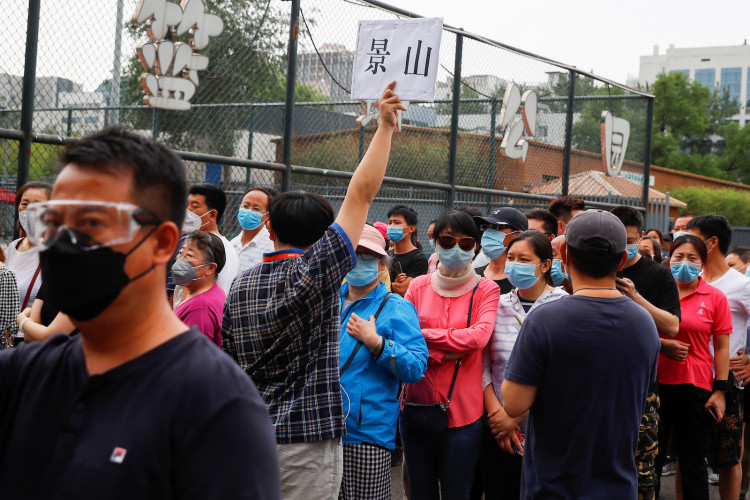Beijing Contains Second Wave COVID-19 Outbreak
Beijing on Sunday downgraded six regions that had been named medium- and high-risk for COVID-19, leaving only one region in Fengtai district, the epicenter for the latest outbreak, as a high-risk area. The city government on Sunday reported just one new case in Fengtai district.
Through a cellphone app launched by the State Council, Beijing residents can check the progress of the coronavirus prevention and control effort on a daily basis. It currently shows five regions in Fengtai, Daxing, Tongzhou and Haidian districts downgraded to low-risk from medium-risk. Meanwhile, Xihongmen region in Daxing district was reduced from high- to medium-risk category. Huaxiang region in Fengtai district is the only remaining high-risk region.
As of July 2, Beijing has conducted over 10 million nucleic acid tests on people across the city, with results indicating a positive rate of about 0.003 percent, according to the Chinese Center for Disease Control and Prevention.
From June 11 to July 5, Beijing reported a total of 335 confirmed cases, among which 11 have been cured.
Luckin Strife Continues, With Conflicting Reports On Chairman's Status
Fraud-stricken Luckin Coffee's internal strife escalated on Monday, with conflicting reports on the status of the company's chairman, Lu Zhengyao.
On Sunday, Luckin removed four board members, including Lu, while voting to add Ying Zeng and Jie Yang as independent board members. The move came just two days after the full board voted against the special board committee's proposal to remove Lu.
Li Hui and Liu Erhai, who were removed from Luckin's board, were said to be the main forces behind the special board committee's investigation of Luckin's reported 2.12 billion yuan ($300 million) in fabricated transactions.
The two new board members, Ying and Jie, were recommended by Lu and are expected to act as his proxies. Another remaining board member, Guo Jinyi, was Lu's assistant in China Auto Renting Co., whose board Lu resigned from in early June.
The Sunday meeting was requested by Haode Investment, a family trust company owned by Lu, which controls 24.94 percent of Luckin's shares.
Meanwhile, Bloomberg News reported that shareholders had voted to oust Lu. The report, which cited Chinese web portal 163.com, said an announcement on the matter could come within a few days. Luckin had no comment on the matter.
China Rolls Back International Flight Restrictions
German airline group Lufthansa, after resuming the route between Frankfurt and Shanghai at the end of June, is about to add another flight between Frankfurt and Nanjing, starting this week.
This marks a revision of the strict "Five-One Policy" regulating international flights that was issued by China Civil Aviation Administration of China (CAAC) in March. The policy limited each domestic airline to one international flight per week to each country, while foreign airlines were allowed one flight to one city in China per week.
The policy was revised in early June to allow more international airlines to fly into China, while enhancing rules providing both incentives and protections. For example, if no passengers on any particular airline test positive for the COVID-19 for three consecutive weeks, the CAAC will allow that airline to increase the number of flights to a maximum of two per week. However, if five passengers or more on one flight test positive for the COVID-19, the CAAC will suspend the airline's services for a week. The suspension will last four weeks if 10 passengers or more on one flight test positive.
New Satellites Launched
China launched the Shiyan-6 (02) satellite aboard a Long March 2 rocket into orbit from the Jiuquan Satellite Launch Center in northwest China on Saturday. This followed the launch of the Gaofen "multi-mode" Earth observation satellite two days earlier from the Taiyuan launch center in north China.
Authorities say the mission of Shiyan-6 (02) satellite is to conduct a space environment study as well as other related technology experiments. The Gaofen will point high-quality optics with multi-spectral capabilities Earthward and will be used for natural resources exploration and protection, emergency management, agriculture and rural areas development.
The coastal Wenchang Satellite Launch Center is expected to launch the Tianwen-1 Mars mission during July 20 to July 25.
Two Southern Cities Curb Property Market Growth
Two southern cities in China have taken steps to curb booming local housing markets. Hangzhou, a city 200 kilometers south of Shanghai that saw booming growth after hosting the G20 in 2016, and Dongguan, which is next to and benefits heavily from Shenzhen's development, both issued notices on July 2 regarding macro-managing skyrocketing sales in their commercial residential markets.
Dongguan announced that it will cap the sales increase of new commercial residential properties to 10 percent within three months, while Hangzhou said it would reserve 50 percent of housing units priced at below RMB35,000 (US$500) per square meter for families who otherwise cannot afford to purchase a home.
Though the COVID-19 pandemic has slowed the recovery of China's property markets, 19,528 apartments and houses were traded in Hangzhou during June, making a record high since June 2017, according to Centaline Property Agency Research Center. Dongguan saw second-hand housing sales increase by 2.7 percent month-on-month and, for first time, exceeding Shenzhen.





